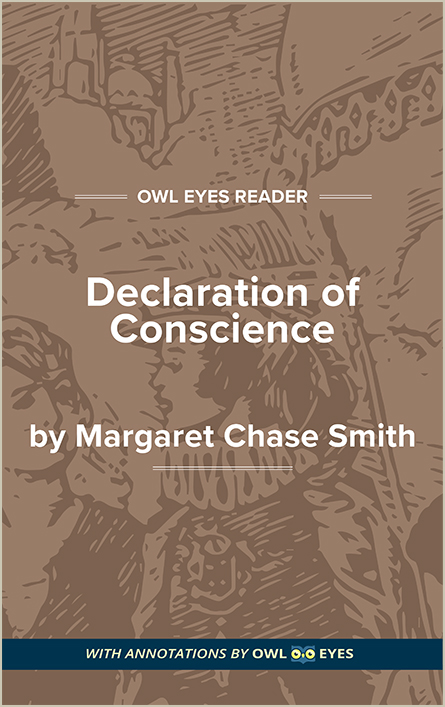Analysis Pages
Historical Context in Remarks to the Senate in Support of a Declaration of Conscience
The Cold War: Smith’s tenure as a US Senator began just as the Cold War began. The Cold War (1947-1991) was an extended period of hostility between the United States and the United Soviet Socialist Republic (USSR). It began shortly after the end of World War II and the dissipation of the threat of Fascism in Germany, Japan, and Italy. Though the United States and USSR never engaged in direct armed confrontation, each nation sought to spread their own economic and political ideologies while curtailing the spread of the other’s. The United States sought to spread Democracy, which values individual rights, and, Capitalism, a free-market economic system. The USSR sought to spread Communism, which values communal rights and equal distribution.
McCarthyism: Joseph McCarthy (1908-1957) was a United States Senator from Wisconsin who took office in January of 1947. In February of 1950, he delivered a famous speech to the Republican Women’s Club of Wheeling, West Virginia, in which he claimed to have a document containing the names of 205 Communist spies who had infiltrated the US Government. The speech sparked national interest and McCarthy gained popularity for being fiercely anti-Communist. For the next four years, McCarthy proceeded to accuse a number of prominent politicians, government employees, and film industry professionals of being Communists or Communist sympathizers. Almost all of his accusations were based on little or no evidence, but the societal fear surrounding Communism meant that many careers and reputations were ruined by the accusations, despite the lack of proof. In 1954, McCarthy was formally censured by the Senate for his actions, effectively ending his career.
Historical Documents: As Smith criticizes the tactics of McCarthyism, she calls on the language of the US Constitution and the Bill of Rights in order to enhance the logic and patriotism of her appeals. By evoking the founding documents of the United States, she aligns herself with patriotism and national values, such as freedom of speech and the right to hold controversial beliefs. She rejects McCarthy’s narrative of safety in favor of emphasizing due process and what she presents as the core principles of “Americanism.” Smith also enhances the logic of her arguments by using references to historical documents, since she grounds herself in established legal precedent rather than relying on the pathos—fueled by “fear and frustration”—that McCarthy feeds on.
Historical Context Examples in Remarks to the Senate in Support of a Declaration of Conscience:
Text of Senator Smith's Speech
🔒"when we fought the enemy instead of ourselves...." See in text (Text of Senator Smith's Speech)
"There are enough proved cases to make this point without diluting our criticism with unproved charges...." See in text (Text of Senator Smith's Speech)
"sufficient campaign issues..." See in text (Text of Senator Smith's Speech)
"Lincoln's day. ..." See in text (Text of Senator Smith's Speech)
" The right to criticize; The right to hold unpopular beliefs; The right to protest; The right of independent thought...." See in text (Text of Senator Smith's Speech)
"Americanism..." See in text (Text of Senator Smith's Speech)
"when the life of a person has been ruined. ..." See in text (Text of Senator Smith's Speech)
"unbecoming an American..." See in text (Text of Senator Smith's Speech)
"a forum of hate and character assassination sheltered by the shield of congressional immunity...." See in text (Text of Senator Smith's Speech)
"national advisory commissions..." See in text (Text of Senator Smith's Speech)
"he Legislative Branch or the Executive Branch of our Government. ..." See in text (Text of Senator Smith's Speech)
"national suicide..." See in text (Text of Senator Smith's Speech)
"fear and frustration..." See in text (Text of Senator Smith's Speech)
"a national feeling..." See in text (Text of Senator Smith's Speech)
"a serious national condition...." See in text (Text of Senator Smith's Speech)
"I..." See in text (Text of Senator Smith's Speech)
"Mr. President:..." See in text (Text of Senator Smith's Speech)

